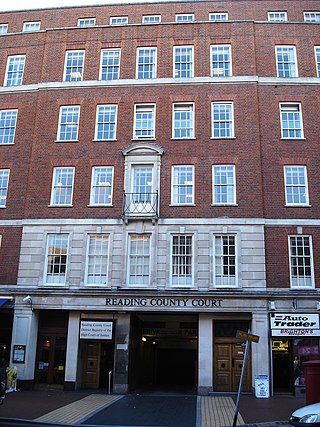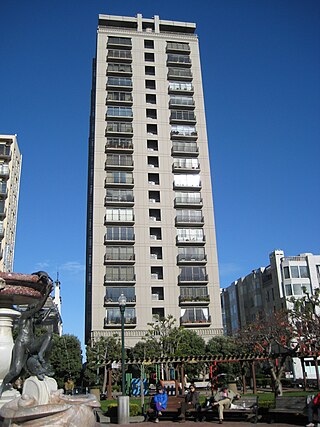Related Research Articles

A landlord is the owner of a house, apartment, condominium, land, or real estate which is rented or leased to an individual or business, who is called a tenant. When a juristic person is in this position, the term landlord is used. Other terms include lessor and owner. The term landlady may be used for the female owners. The manager of a pub in the United Kingdom, strictly speaking a licensed victualler, is referred to as the landlord/landlady. In political economy it refers to the owner of natural resources alone from which an economic rent, a form of passive income, is the income received.

A lease is a contractual arrangement calling for the user to pay the owner for the use of an asset. Property, buildings and vehicles are common assets that are leased. Industrial or business equipment are also leased. In essence, a lease agreement is a contract between two parties: the lessor and the lessee. The lessor is the legal owner of the asset, while the lessee obtains the right to use the asset in return for regular rental payments. The lessee also agrees to abide by various conditions regarding their use of the property or equipment. For example, a person leasing a car may agree to the condition that the car will only be used for personal use.
A leasehold estate is an ownership of a temporary right to hold land or property in which a lessee or a tenant has rights of real property by some form of title from a lessor or landlord. Although a tenant does hold rights to real property, a leasehold estate is typically considered personal property.
Rent control in Ontario refers to a system of rent regulation in Ontario, Canada which limits the amount by which the rent paid by tenants for rental accommodation can increase. It applies to any unit that was first occupied for residential purposes before November 15, 2018.
Landlord harassment is the willing creation, by a landlord or their agents, of conditions that are uncomfortable for one or more tenants in order to induce willing abandonment of a rental contract. This is illegal in many jurisdictions, either under general harassment laws or specific protections, as well as under the terms of rental contracts or tenancy agreements.

The Landlord and Tenant Act 1954 is an act of the United Kingdom Parliament extending to England and Wales. Part I of the act, which dealt with the protection of residential tenancies, is now largely superseded. Part II of the act is a statutory code governing business tenancies. Various other matters are covered in Parts III and IV.

An assured tenancy is a legal category of residential tenancy to an individual in English land law. Statute affords a tenant under an assured tenancy a degree of security of tenure. A tenant under an assured tenancy may not be evicted without a reasonable ground in the Housing Act 1988 and, where periodic changes in rent are potentially subject to a challenge before a rent assessment committee.
Rent regulation in New York is a means of limiting the amount of rent charged on dwellings. Rent control and rent stabilization are two programs used in parts of New York state. In addition to controlling rent, the system also prescribes rights and obligations for tenants and landlords.

The Landlord and Tenant Act 1985 is a UK act of Parliament on English land law. It sets minimum standards in tenants' rights against their landlords.

Bruton v London and Quadrant Housing Trust[1999] UKHL 26 is an English land law case that examined the rights of a 'tenant' in a situation where the 'landlord', a charitable housing association had no authority to grant a tenancy, but in which the 'tenant' sought to enforce the duty to repair on the association implied under landlord and tenant statutes. The effect of the case is to create the relationship of de facto landlord and tenant between the parties.
The history of English land law can be traced back to Roman times. Throughout the Early Middle Ages, where England came under rule of post-Roman chieftains and Anglo-Saxon monarchs, land was the dominant source of personal wealth. English land law transformed further from the Anglo-Saxon days, particularly during the post-Norman Invasion feudal encastellation and the Industrial Revolution. As the political power of the landed aristocracy diminished and modern legislation increasingly made land a social form of wealth, subject to extensive social regulation such as for housing, national parks and agriculture.

Landlord–tenant law is the field of law that deals with the rights and duties of landlords and tenants.
Inequality of bargaining power in law, economics and social sciences refers to a situation where one party to a bargain, contract or agreement, has more and better alternatives than the other party. This results in one party having greater power than the other to choose not to take the deal and makes it more likely that this party will gain more favourable terms and grant them more negotiating power. Inequality of bargaining power is generally thought to undermine the freedom of contract, resulting in a disproportionate level of freedom between parties, and that it represents a place at which markets fail.
The Ellis Act is a 1985 California state law that allows landlords to evict residential tenants to "go out of the rental business" in spite of desires by local governments to compel them to continue providing rental housing.

English land law is the law of real property in England and Wales. Because of its heavy historical and social significance, land is usually seen as the most important part of English property law. Ownership of land has its roots in the feudal system established by William the Conqueror after 1066, but is now mostly registered and sold on the real estate market. The modern law's sources derive from the old courts of common law and equity, and legislation such as the Law of Property Act 1925, the Settled Land Act 1925, the Land Charges Act 1972, the Trusts of Land and Appointment of Trustees Act 1996 and the Land Registration Act 2002. At its core, English land law involves the acquisition, content and priority of rights and obligations among people with interests in land. Having a property right in land, as opposed to a contractual or some other personal right, matters because it creates priority over other people's claims, particularly if the land is sold on, the possessor goes insolvent, or when claiming various remedies, like specific performance, in court.
The history of rent control in England and Wales is a part of English land law concerning the development of rent regulation in England and Wales. Controlling the prices that landlords could make their tenants pay formed the main element of rent regulation, and was in place from 1915 until its abolition by the Housing Act 1988.
In England and Wales, a section 21 notice, also known as a section 21 notice of possession or a section 21 eviction, is a notice under section 21 of the Housing Act 1988, that a landlord must give to their tenant to begin the process to take possession of a property let on an assured shorthold tenancy without providing a reason for wishing to take possession. The expiry of a section 21 notice does not bring a tenancy to its end. The tenancy would only be ended by a landlord obtaining an order for possession from a court, and then having that order executed by a County Court bailiff or High Court enforcement officer. Such an order for possession may not be made to take effect earlier than six months from the beginning of the first tenancy unless the tenancy is a demoted assured shorthold tenancy. If the court is satisfied that a landlord is entitled to possession, it must make an order for possession, for a date no later than 14 days after the making of the order unless exceptional hardship would be caused to the tenant in which case possession may be postponed to a date no later than six weeks after the making of the order. The court has no power to grant any adjournment or stay of execution from enforcement unless the tenant has a disability discrimination, public law or human rights defence, or the case is pending an appeal.
Rent regulation is a system of laws for the rental market of dwellings, with controversial effects on affordability of housing and tenancies. Generally, a system of rent regulation involves:
The Costa–Hawkins Rental Housing Act ("Costa–Hawkins") is a California state law enacted in 1995, placing limits on municipal rent control ordinances. Costa–Hawkins preempts the field in two major ways. First, it prohibits cities from establishing rent control over certain kinds of residential units, such as single-family dwellings, condominiums, and newly constructed apartment units. Second, it prohibits "vacancy control", also called "strict" rent control. The legislation was sponsored by Democratic Senator Jim Costa and Republican assembly member Phil Hawkins.

The Housing Act 1988 is an act of Parliament in the United Kingdom. It governs the law between landlords and tenants. The act introduced the concepts of assured tenancy and assured shorthold tenancy. It also facilitated the transfer of council housing to not-for-profit housing associations, which was then carried out partly through the system of Large Scale Voluntary Transfer.
References
- R Arnott, ‘Time for Revisionism on Rent Control?’ (1995) 9(1) Journal of Economic Perspectives 99
- A Anas, ‘Rent Control with Matching Economies: A Model of European Housing Market Regulation’ (1997) 15(1) Journal of Real Estate Finance and Economics 111–37
- S Bright, "Avoiding Tenancy Legislation: Sham and Contracting Out Revisited" [2002] CLJ 146
- S Bright, Landlord and Tenant Law in Context (2007)
- T Ellingsen and P Englund, 'Rent regulation: An introduction' (2003) 10 Swedish Economic Policy Review 3
- M Haffner, M Elsinga and J Hoekstra, 'Rent Regulation: The Balance between Private Landlords and Tenants in Six European Countries' (2008) 8(2) International Journal of Housing Policy 217
- H Lind, 'Rent Regulation: A Conceptual and Comparative Analysis' (2001) 1(1) International Journal of Housing Policy 41
- C Rapkin, The Private Rental Housing Market in New York City (1966)
- G Sternlieb, The Urban Housing Dilemma (1972)
- P Weitzman, 'Economics and Rent Regulation: A Call for a New Perspective' (1984-1985) 13 NYU Review of Legal and Social Change 975-988